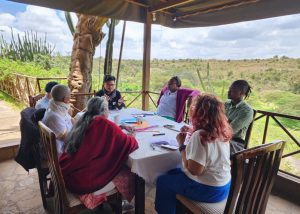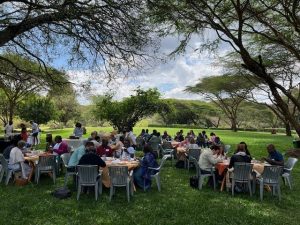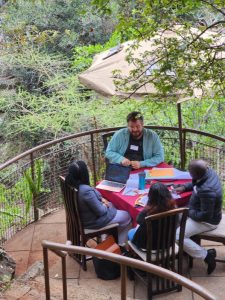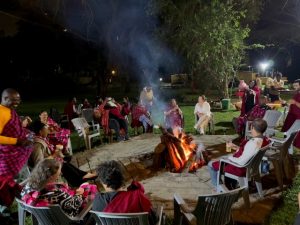Relationships as the real infrastructure – reflections on the GFCF Community Philanthropy Symposium
27 Oct 2025
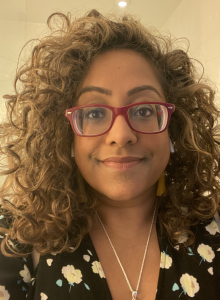
By: Lena Bheeroo, ADD International and a 2024 / 2025 #ShiftThePower Fellow
In October 2025, I spent two weeks in Nairobi, Kenya, as part of the #ShiftThePower Fellowship. The first week was the GFCF’s Community Philanthropy Symposium at Masai Lodge, nestled in the middle of Nairobi National Park. The Lodge was lush and full of life, a place where baboons appeared at dusk and small hyraxes played across the grass. The sounds of nature became our constant background rhythm, reminding us that we were held in something larger than ourselves.
The GFCF created this space with deep intention, not a conference, not a retreat – but a gathering grounded in care. I’ve attended #ShiftThePower events before, but this one felt different. Smaller, more intimate, and deeply relational, it brought together Fellows – along with other GFCF partners and allies – from across continents to slow down, connect and imagine.
As someone rooted in grassroots activism in the UK, I know how rare it is to create the right conditions for openness, spaces without ego, where listening is valued as much as speaking. The Symposium found that balance. Through shared meals, reflective sessions and unhurried conversations that invited vulnerability, we met each other as people first, practitioners second.
For the Fellows present, meeting in person after journeying together online throughout the year was deeply grounding. Seeing the Fellows I had come to know through a screen – from Argentina, Hungary, Ukraine, Nepal, India, Indonesia, Vietnam, Kenya, Uganda, Tanzania and beyond – transformed our understanding of one another. It deepened the trust we had begun to build and reminded me that connection is not only virtual or conceptual, but something felt and embodied. Being together allowed me to see how others around the world are navigating the same questions I hold in my work, and to feel part of a wider, living movement.
Exploring power and possibility
Across three days, our conversations circled around power, community philanthropy and the shifting role of civil society. We reflected on how communities sustain themselves when formal systems fail, and how giving, in many places, is as much spiritual and cultural as it is financial.
There was a shared desire to move beyond transactional forms of philanthropy towards ways of working rooted in relationship and care. What does it mean to accompany rather than direct? To share responsibility rather than delegate it? How can resources flow in ways that strengthen solidarity instead of dependency, and be valued for all that they bring?
We returned often to a quiet but radical idea: that communities already hold the knowledge, values and collective strength they need. Our role is not to replace that wisdom, but to recognize it, resource it and work in harmony with it.
Relationships as the real infrastructure
Amid the intensity of our discussions, there was a softness too. Evenings were for connection, eating together, laughing and noticing how quickly trust can grow when people are fully present.
One evening, we were welcomed by our Masai hosts who shared their customs through dance and story. It was a reminder that culture, land and community are inseparable, and that strength often comes from traditions of belonging that have endured for generations.
What stayed with me most was how relational this work truly is. The kind of change #ShiftThePower calls for cannot be designed on a spreadsheet or measured in short-term outputs. It lives in how we relate in generosity, patience and shared accountability. These are not soft skills; they are the foundations of transformation.
Interconnection over isolation
Many of our reflections returned to the question of connection. Even when systems feel unstable, we can still choose to link arms, to accompany and to hold one another through uncertainty.
Across different contexts, we recognized similar challenges: institutions that concentrate power, funding models that limit imagination and civic spaces that are shrinking. Yet we also recognized something hopeful: that we don’t need to wait for a perfect future. Change is already alive in small community initiatives, in local giving networks and in alliances that quietly reshape what accountability looks like.
These threads of solidarity, often invisible from the outside, are what sustain the work. They remind us that transformation begins with relationships, with how we choose to show up for one another.
What is possible now
As the Symposium drew to a close, a phrase kept echoing: possible now. It captures something both humble and hopeful, that the change we seek isn’t deferred to a distant horizon but made real in our everyday choices.
We don’t have to wait for new systems to be built elsewhere. We can begin by embodying different ways of working and relating here and now, building trust, practicing care and making space for others to lead.
Leaving Nairobi, I carried with me a sense of renewal: that shifting power is not only about structures or policies, but about how we live our values in relationship with others. Those days among Fellows and other allies from across the world felt like a glimpse of what that future could look like, one that is more grounded, generous, connected and alive with possibility.
In times of division and fatigue, the Community Philanthropy Symposium in Nairobi offered something rare, a few luminous days of ideas, courage and care. It reminded me that transformation is not abstract; it begins in relationship. This gathering of community philanthropy practitioners built on the quiet momentum of a larger change, one that grows through connection, courage and care. And that this, imperfect and alive as it is, is what is possible now.
By: Lena Bheeroo, Head of Philanthropic Partnerships and Influencing at ADD International. Lena is a 2024 / 2025 #ShiftThePower Fellow.


